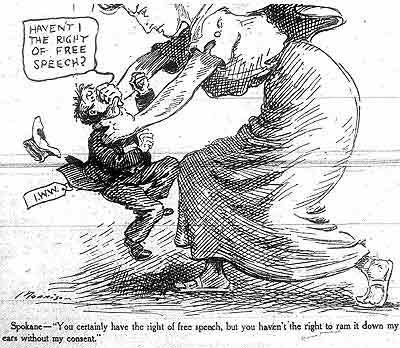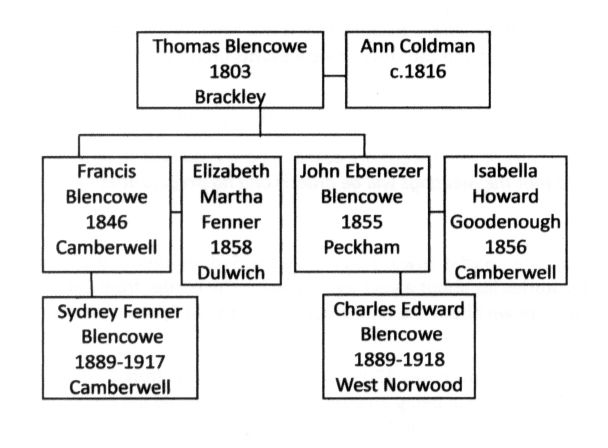Two Blencowe Adventurers
In 1909, Spokane in Washington State USA became the centre of workers' rights movement worldwide.
At this time Spokane was a centre for the agriculture, lumber, construction and mining industries. Agricultural work and, to a lesser extent, work in the lumber industry, was temporary. At some point, the harvest was collected or the forest leveled, and those who did the work had to move on. Employment agencies were numerous in Spokane at the time, their role to hire this transient workforce. It was their deceitful practice of charging a $1 for a job to prospects and then arranging for them to be fired shortly after, that caused a furore that was communicated around the world.
In 1905, workers had formed a union, The International Workers of the World (IWW), to fight these practices. In 1908 the IWW set up a union hall in Spolkane so men could find a job without paying the $1 fee. This caused the political and industrial leaders of the City of Spokane to pass a law prohibiting street meetings and public rallies. IWW members and organisers obeyed this law until mid 1909, when the law was modified thus inflaming the IWW who perceived the law to favour the Salvation Army, an old enemy of the union.

By October, the IWW national leadership decided that it was time for a major political action. The IWW newspaper in Spokane, The Industrial Worker, ran the story of local events under the headline: 'Wanted - Men to Fill the Jails of Spokane'. The national headquarters sent a letter to all of the IWW local offices throughout the United States:
November 2nd:Free Speech Day. All lovers of free speech are asked to be in readiness to be in Spokane on that date... It is of course needless to add that the meetings will be orderly and no irregularities of any kind will be tolerated.
At this time two Blencowe cousins Charles Edward Blencowe and Sydney Fenner Blencowe from Dulwich, London who had been in the Northwest Territories for about a year were crossing the border from Canada to the USA ( St Albans Vermont). They may or may not have known about the unrest but they both put Spokane as their intended destination on the customs forms.
What happened at Spokane on 2 November, 1909 made international news. Hundreds of workers descended on Spokane, having come for the specific purpose of being arrested. One person would get up on a soapbox, begin speaking and promptly be arrested. The speeches usually got no further than 'Fellow workers...' before the arrest was made.
The Spokane Police Department arrested 103 speakers that day. The Spokane jail filled. An abandoned, unheated schoolhouse was pressed into service to hold the ever-increasing numbers of prisoners. When the schoolhouse filled, an empty Army barracks was placed at the city's disposal.
The speakers kept on coming. Over the course of four months, 1200 people had been jailed. As months passed and speakers kept arriving in Spokane to get themselves arrested, the leaders of the City did some accounting. They had spent over $250,000 convicting and jailing speakers. They were spending additional thousands of dollars every week to maintain extra police and to feed and house prisoners.
On 4 March, 1910, the City of Spokane released all of the free speech prisoners. A few days later, the Governor of Washington State pardoned the IWW organizers who were being held on conspiracy charges. The right of the union to freedom of speech and freedom of assembly was recognized by the city.
What role, if any, Charles and Sydney Blencowe played in Spokane we may never know. We do know that Charles returned to England. Sydney migrated to Perth in Western Australia in 1912 where he grew fruit and worked as a letter carrier before enlisting in 1915.
Sadly both cousins died in the war. Charles Edward Blencowe was quite a character enlisting with the Royal Fusiliers in 1915 under the false name of Arthur Stewart of Putnam, Ontario, Canada giving his next of kin as a brother, Stuart Stewart and stating that he was a farmer — unlikely for a London boy! He joined the Royal Sussex Regiment where his CO described Charles as “Clean and fairly smart with good word of command and plenty of confidence. Keen: should do well as an officer if smartened up!” Four days after transferring to the Wiltshire Regiment in 1918, Charles was killed in action in Belgium or France. Charles is remembered on the Tyne Cot Memorial for missing, unknown soldiers.
Sydney Fenner Blencowe fought with the Australian Infantry A.I.F. and was killed in 1817 in action at Bullecourt, France and remembered on the Villers-Bretonneux Memorial. Interestingly, at the border crossing, Sydney gave his father's details as Frank Blencowe of Battleford, Sakatchewan. Is this fact or fiction as dad, Francis aka Frank was in England for Censuses 1901 & 1911?
Family Tree
Charles and Sydney descend from Thomas Blencowe born 1803 Brackley

Roger Blinko
Australia